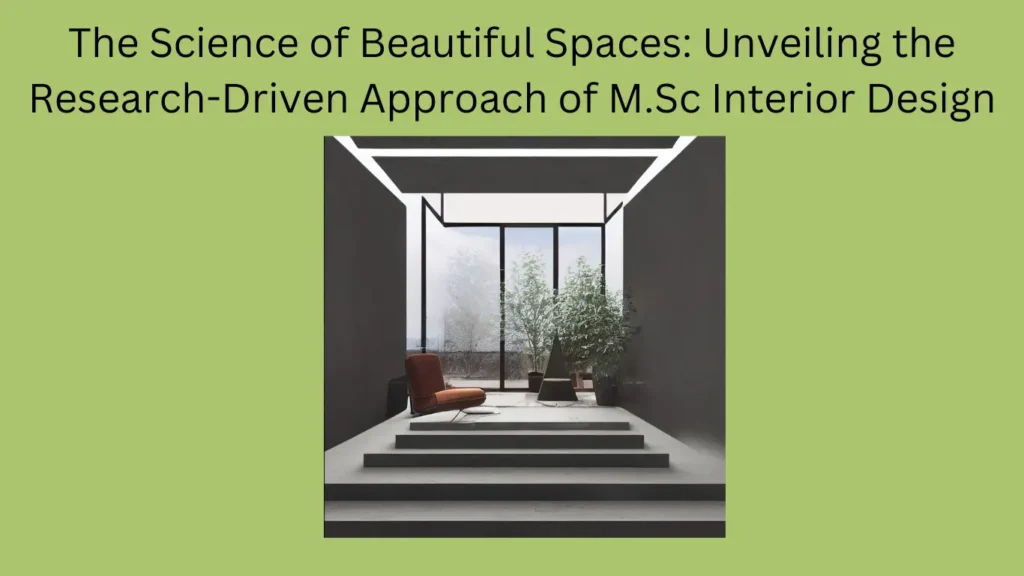Embarking on the journey of mastering the art and science of interior design is a captivating endeavor. The M.Sc in Interior Design stands at the intersection of creativity and research, offering a unique approach to shaping beautiful spaces. This guide explores the distinctive features of the program, emphasizing its research-driven methodology and how it prioritizes a people-first perspective in designing environments.
M.Sc Interior Design: A Holistic Approach
Beyond Aesthetics
The M.Sc Interior Design program goes beyond the surface, delving into the science of creating spaces that resonate with functionality, sustainability, and the emotional well-being of occupants. It transcends traditional aesthetics, focusing on the holistic experience of inhabitants.
Research at the Core
At the heart of the program is a robust research framework. Students engage in in-depth research projects, exploring the latest trends, materials, and technologies. This research-driven approach equips them with the knowledge and skills needed to address contemporary challenges in interior design.
The Marriage of Creativity and Research
Design Thinking
The program fosters a design thinking mindset, encouraging students to approach challenges with creativity, empathy, and a deep understanding of human needs. It emphasizes that beautiful spaces are not only visually pleasing but also functional and purposeful.
User-Centric Design
A people-first approach is embedded in the curriculum. Students learn to prioritize the needs and preferences of end-users, ensuring that designs are not just aesthetically pleasing but also enhance the overall well-being of those who inhabit the spaces.
Real-World Applications
Industry-Relevant Skills
M.Sc Interior Design graduates emerge with a skill set that aligns with industry demands. The program integrates practical experiences, internships, and collaborations with industry professionals, ensuring that students are well-prepared for the challenges of the real-world design landscape.
Sustainable Design Practices
Recognizing the importance of sustainable practices, the program instills a sense of responsibility towards the environment. Students explore eco-friendly materials, energy-efficient designs, and innovative solutions to create spaces that are not just beautiful but also environmentally conscious.
Empowering Future Interior Designers
Nurturing Talent
The M.Sc Interior Design program nurtures individual talent. It encourages students to discover and hone their unique design voice while providing a supportive environment that fosters collaboration, creativity, and critical thinking.
Career Guidance and Support
A people-first perspective extends to career guidance and support. The program assists students in navigating the professional landscape, connecting them with industry networks, and providing resources to launch successful careers in interior design.
Conclusion: Transforming Spaces, Enriching Lives
The M.Sc Interior Design program represents the convergence of art and science, creativity and research. By embracing a people-first philosophy, it not only transforms spaces but enriches the lives of those who inhabit them. For those seeking a profound understanding of interior design, the M.Sc program offers a journey into the science of creating beautiful, functional, and meaningful environments.
FAQs
1. What distinguishes the M.Sc Interior Design program?
- The M.Sc program goes beyond aesthetics, emphasizing research-driven design, creativity, and a people-first approach to create holistic and meaningful spaces.
2. How does the program integrate research into interior design?
- The program integrates research through in-depth projects, exploring trends, materials, and technologies. This research-driven approach prepares students for contemporary design challenges.
3. What is the significance of design thinking in the program?
- Design thinking is fostered to encourage creativity, empathy, and understanding of human needs. The program believes that beautiful spaces should be both visually pleasing and purposeful.
4. How does the program prepare students for real-world design challenges?
- The program ensures students acquire industry-relevant skills through practical experiences, internships, and collaborations. It emphasizes sustainable practices and responsibility towards the environment.
5. How does the M.Sc program support students in their interior design careers?
- The program nurtures individual talent, providing career guidance, and support. It connects students with industry networks, fostering collaboration, creativity, and critical thinking for successful interior design careers.

